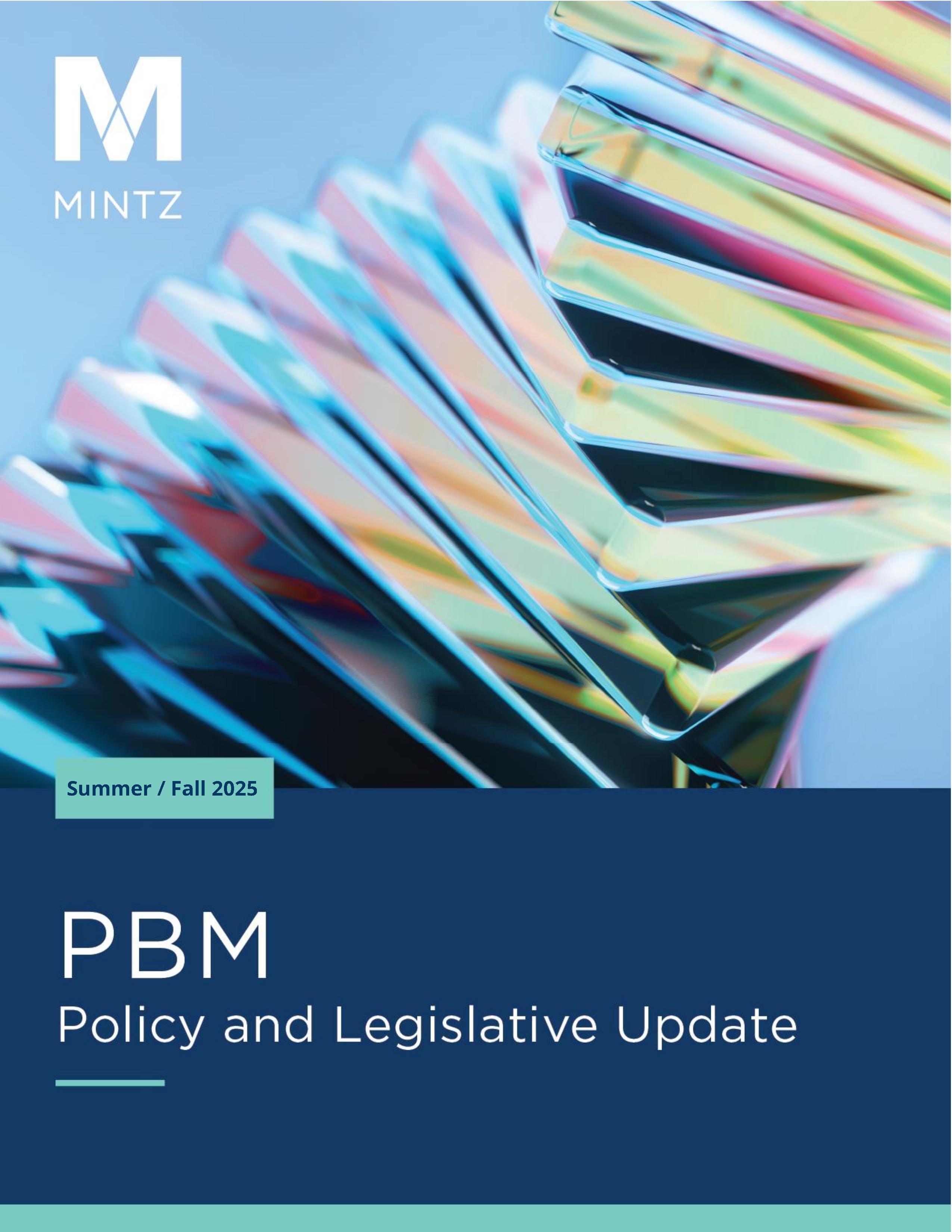
Mintz’s Managed Care, PBMs & Pharmacies practice is pleased to present a combined Summer / Fall 2025 PBM Policy and Legislative Update. This edition builds upon prior issues and summarizes activity from April through September that affects the PBM industry. It highlights federal legislative updates, state legislative updates, legal challenges, and other noteworthy events and trends affecting the PBM industry. We hope you find the PBM Policy and Legislative Update to be a useful resource. For more information or to discuss how these developments may impact your organization, please contact us at [email protected]. Podcast Companion PieceFor a quick run-down of the high points from the report, be sure to check out our 7-minute podcast here. |  |
In this edition of the Mintz PBM Update
Federal Legislative Activity and OversightFederal Legislative ActivityOther Federal ActivityFTC Updates | State Legislation and LitigationRecently Enacted State LegislationPending State LegislationState Law ChallengesState EnforcementState Prescription Drug Boards | Other Industry NewsInsulin CasesOpioid CasesTrump Administration Drug Pricing ActivitiesAnd more |
The pharmacy benefits management (PBM) regulatory landscape is evolving rapidly at both the federal and state levels, making it critical for our clients involved in the PBM space to stay apprised of industry developments as they happen. Our team actively monitors these developments to provide you with this quarterly PBM Policy and Legislative Update. This update builds on prior issues and highlights federal and state activity from April through September 2025.
Federal Legislative Activity and Oversight
Federal Legislative Activity
As we noted in our Spring 2025 Update, the One Big Beautiful Bill Act (OBBB) introduced in May 2025 included some of the federal PBM reform proposals that have been considered over the past few years (see our blog post for more information on the PBM-related provisions). However, after the OBBB narrowly passed in the House, all PBM reform efforts were removed during Senate negotiations and ultimately removed from the version sent for signature. Since then, congressional debate over US drug pricing has remained active, but there hasn’t been significant momentum behind any specific PBM reforms.
PBM Reform Act of 2025 (H.R. 4317). On July 10, 2025, Reps. Earl “Buddy” Carter (R-GA) and Debbie Dingell (D-MI) introduced the PBM Reform Act of 2025, a standalone, bipartisan bill that builds upon the PBM-related provisions originally included in the OBBB. The bill would, among other things, ban spread pricing in Medicaid, require PBMs to pass 100% of manufacturer rebates to plan sponsors, and delink PBM compensation from drug prices in Medicare Part D. It also would require detailed reporting and would grant federal agencies broad authority to audit and monitor PBM practices. A Senate companion bill is expected to be introduced in the near future.
Other Federal Activity
Drug Price Transparency. On June 24, 2025, during a meeting hosted by Transparency-Rx, a coalition of smaller PBMs advocating for drug pricing reform and transparency, Centers for Medicare & Medicaid Services (CMS) Administrator Dr. Mehmet Oz signaled that by the end of 2025, CMS will promulgate a rule requiring health insurers and PBMs to disclose net prices of drugs. This comes after the Trump administration issued a Request for Information in May 2025 on how to improve drug price transparency, pursuant to the related Executive Order. On September 2, 2025, the Department of Health and Human Services (HHS) finalized a rule designed to give providers and patients access to drug prices at the point of care, among other reforms. This rule requires Medicare Part D plan sponsors and prescribers to use real-time benefit tools that display patient-specific drug pricing during clinical visits, helping prescribers identify and compare lower-cost medication options. In keeping with the theme of transparency, Dr. Oz also said he hopes PBMs will voluntarily stop retaining rebates and instead pass the savings along to health plans and patients. If not, regulators and lawmakers are prepared to force their hand.
Department of Labor Pushes for Pharmacy Benefits Regulation. On September 4, 2025, the Employee Benefits Security Administration (EBSA) of the US Department of Labor (DOL) previewed its intent to release new PBM-related regulations under the Unified Agenda of Regulatory and Deregulatory Actions. This agenda includes, among other things, the promulgation of rules targeting PBM practices to address President Trump’s April 15 Executive Order as it relates to improving drug pricing transparency and setting forth certain direct and indirect compensation disclosure requirements. EBSA’s proposed actions will also include (1) further examination into transparency in coverage requirements pursuant to President Trump’s February 25 Executive Order as a follow-up to the Transparency in Coverage final rule published November 12, 2020, and (2) rulemaking in May 2026 in response to President Trump’s January 20, 2025 memorandum entitled “Delivering Emergency Price Relief for American Families and Defeating the Cost-of-Living Crisis,” aiming to “explore ways to reduce costs and burdens imposed on employers and other plan fiduciaries for producing and distributing welfare plan disclosures,” and ways to make these disclosures understandable and accessible to participants and beneficiaries.
FTC Updates
In our Spring 2025 Update, we reported on the FTC General Counsel’s order to stay the FTC’s in-house PBM insulin pricing case because none of the sitting FTC commissioners were able to participate in the case. Shortly after the stay was issued, Chairman Ferguson un-recused himself to ensure continuity of the case, citing that his original reason for recusal was because he had previously advised on whether the Commonwealth of Virginia’s attorney general should file an amicus brief in a class action against PBMs. Less than a week later, the US Senate confirmed Commissioner Mark Meador as the agency’s third Republican member. With two commissioners able to consider the claims, the FTC issued an order on August 27 to lift the stay and restart the case alleging that CVS, Express Scripts, and OptumRx artificially inflated insulin prices. The PBMs filed a motion to dismiss on August 29, alleging that the FTC is exceeding its authority to address unfairness and arguing that PBMs are not alone in the pharmaceutical ecosystem and that drugmakers are responsible for setting list prices for insulin. However, the FTC alleges that the PBMs used unfair rebate schemes that inflated prices by prioritizing insulin drugs with high list prices and prevented patients from accessing lower-priced drugs. While the evidentiary hearing for the case is scheduled to start on April 8, 2026, the PBMs filed a motion to stay discovery and suspend the evidentiary hearing until after the Commission decides on the motion to dismiss.
In Express Scripts’ separate litigation challenging the FTC’s 2024 PBM Report, the federal district court denied the FTC’s motion to dismiss and stayed the case pending the Eighth Circuit’s decision in the PBM’s appeal to the district court’s denial of an injunction in the insulin pricing case.
In other news, the FTC and DOJ held “listening sessions” this summer to discuss ways to make prescription drugs more affordable by promoting competition. The three panels focused on (1) antitrust enforcement, Patent & Trademark Office (PTO) reform, and legislative and regulatory action necessary to level the playing field between pharmaceutical companies and generic / biosimilar competitors; (2) the business relationships between drug manufacturers and PBMs and how those impact drug competition; and (3) proposed actions and initiatives to reduce drug prices. Observers noted that while regulators, academics, and industry group representatives sat on the panels, significant players such as drug manufacturers, health insurance companies, pharmacies, and PBMs provided no input, leaving attendees unclear about whether any substantial reform is possible.
We will continue to monitor and report on developments in the pending litigation and FTC-related matters.
State Legislation and Litigation
Recently Enacted State Legislation
States enacted the following legislative proposals between April and September 2025. The initiatives listed below impact: (1) PBM contracts with pharmacies and providers; (2) pharmacy pricing and reimbursement requirements; (3) pharmacy network requirements; and/or (4) PBM licensure and registration requirements.
April – September 2025
| State | Description of Measure(s) | Date(s) Enacted | Effective Date(s) |
|---|---|---|---|
| Alaska | S.B. 132. This law requires PBMs to obtain a license from the Director of Insurance and to renew it biennially, with a $20,000 fee for both initial and renewal applications. The law imposes disclosure obligations including identification of owners, officers, directors, and partners; designation of a compliance officer; and submission of certified financial statements. PBMs must notify the director within 30 days of specified changes or legal actions. | 7/30/2025 | 1/1/2026 |
| Arkansas | S.B. 103. This law establishes an any-willing-pharmacy / pharmacist requirement for PBM networks. PBMs may not deny or exclude qualified pharmacies willing to accept relevant and reasonable participation terms, may not condition participation across networks, and may not limit networks to affiliates or online-only options. Additionally, the law provides a complaint process and penalties. | 4/7/2025 | 4/7/2025 |
| S.B. 104. This law prohibits ghost networks (listing pharmacies that are unavailable) and carveout networks (restricting access to certain drugs or pharmacies), bars PBMs from imposing unfair or deceptive trade practices, and requires PBMs to consider individual patient circumstances when enforcing access conditions. The law mandates transparency in network composition and ensures patients can access in-person pharmacy services without being forced into mail-order or affiliate-only options. The Insurance Commissioner may levy penalties up to $100,000 per violation. | 4/10/2025 | 4/10/2025 | |
| S.B. 583. This law authorizes pharmacies, pharmacists, and businesses providing pharmacy services to pursue a private right of action for violations of Maximum Allowable Cost (MAC) list requirements. | 4/23/2025 | 8/5/2025 | |
| California | A.B. 116. This law establishes a comprehensive regulatory framework for PBMs contracting with health care service plans or insurers. Beginning January 1, 2027, PBMs must obtain licensure from the Department of Managed Health Care, submit financial statements, and pay application and oversight fees. The law creates dedicated funds for PBM fees and penalties and mandates PBMs to report drug pricing and fee data to the Department of Health Care Access and Information to support transparency initiatives. | 6/30/2025 | 6/30/2025 |
| S.B. 40. This law caps copayments, coinsurance, deductibles, or other cost-sharing for a 30-day supply of insulin at $35, effective January 1, 2026 for large-group health plans and January 1, 2027 for individual and small-group plans. It also requires that at least one insulin in each drug type, form, and concentration be included on the formulary and prohibits step therapy protocols for insulin coverage, except where at least one insulin per drug type is available without step therapy. These provisions do not apply to Medi-Cal managed care plans. | 10/13/2025 | 1/1/2026 (Large-group plans) 1/1/2027 (Small-group plans) | |
| S.B. 41. This law requires PBMs contracting with health plans or insurers to be licensed by the California Department of Managed Health Care by January 1, 2027 and subjects them to audits, investigations, and civil penalties for violations. It bans spread pricing in PBM contracts executed or amended on or after January 1, 2026 and voids such terms by January 1, 2029. PBMs must use a pass-through pricing model, disclose pharmacy benefit management fees, and remit 100% of manufacturer rebates to payers to reduce member costs. The law prohibits steering patients exclusively to affiliated pharmacies, bars discriminatory reimbursement against nonaffiliated pharmacies, and requires patient cost-sharing to reflect the actual amount paid by the plan or insurer. We delve deeper into S.B. 41 and its impacts on PBM operations in the state here. | 10/11/2025 | 1/1/2027 (licensure and compliance requirements) 1/1/2026 (Spread pricing ban) | |
| Colorado | S.B. 301. This law allows a health care provider to adjust the dose or frequency of a chronic maintenance prescription drug without requiring prior authorization from an insurance carrier or PBM if (1) the drug has previously been approved for coverage and the provider continues to prescribe the drug for the same chronic condition; (2) the drug is not an opioid or a scheduled controlled substance; and (3) the dose or frequency has not been adjusted more than twice without prior authorization. | 5/29/2025 | 8/6/2025 |
| Connecticut | H.B. 7192. This law adds the following new obligations: (1) PBMs must act in good faith and fair dealing toward health carriers and disclose any conflicts of interest; (2) PBMs must offer health plans the option to pay the same price PBMs pay pharmacies for prescription drugs; (3) health carriers must report annual pricing and profit data involving PBMs and mail-order pharmacies to the Insurance Commissioner; and (4) the Commissioner gains explicit authority to audit PBM-pharmacy contracts for compliance. | 7/8/2025 | 10/1/2025 (Good Faith & Conflict Disclosure) 1/1/2026 (Pass-Through Pricing, Transparency Reporting) |
| H.B. 6436. This law requires PBMs to file annual rebate transparency reports with the Insurance Commissioner starting March 1, 2026. Reports must detail aggregate rebate amounts collected from drug manufacturers for health carriers’ formularies and patient utilization. The law directs the Commissioner to create a standardized reporting form, protects submitted data from public disclosure, and mandates an aggregated legislative report by April 1 each year. PBMs face penalties of up to $7,500 per violation for noncompliance. | 7/8/2025 | 10/1/2025 | |
| Delaware | H.B. 212. This law establishes stricter standards for PBM audit and recovery practices and requires PBMs to provide written notice to pharmacies when initiating recoupment or chargeback efforts, detailing the error and justification. The law prohibits the use of extrapolation in audits unless mandated by law and requires findings to be based on actual overpayments. | 9/3/2025 | 9/3/2025 |
| Illinois | H.B. 1697. This law imposes new transparency and fairness standards on PBMs. It prohibits spread pricing, patient steering, and misclassification of specialty drugs, requires PBMs to remit 100% of manufacturer rebates to health plans, and mandates annual audit rights in PBM contracts. PBMs must submit an initial report by August 1, 2025 detailing all administered health plans and covered lives, with ongoing reporting obligations. These provisions apply to health benefit plans renewed or issued on or after January 1, 2026. | 7/1/2025 | 1/1/2026 (Most Provisions) 8/1/2025 (PBM reporting requirement) |
| Indiana | S.B. 80. This law amends existing law to require a PBM to provide claims data to the contract holder no later than 15 business days after the information or claims data is requested, and removes the requirement for the PBM to confirm receipt of a request for an audit to the contract holder not later than 10 business days after the information is requested. | 5/6/2025 | 7/1/2025 |
| H.B. 1004. This law requires that if a health plan–PBM agreement applies less than 85% of estimated manufacturer rebates to reduce prescription drug costs before calculating a member’s cost-sharing, the PBM must provide the policyholder with an annual notice. The notice must include: (1) what a rebate is; (2) how rebates accrue to the health plan; and (3) the aggregate rebate amount for drugs dispensed under the plan in the prior year. The law also places restrictions on hospital provider contracts, prohibiting linkage of reimbursement or terms to separate hospital agreements or products. | 5/6/2025 | 5/6/2025 | |
| Iowa | S.F. 383. This law establishes comprehensive PBM reforms effective July 1, 2025. Among other things, PBMs must use pass-through pricing and are prohibited from spread pricing unless specific criteria apply. PBMs must reimburse pharmacies at no less than NADAC (or WAC if NADAC unavailable) plus a $10.68 professional dispensing fee. The law mandates 100% rebate pass-through to health carriers or plan sponsors, prohibits discrimination against pharmacies, and preserves patient choice of pharmacy. PBMs must submit quarterly reports on reimbursement variances and provide an appeal process for rate disputes. | 6/11/2025 | 7/1/2025 |
| Louisiana | H.B. 264. This law prohibits spread pricing and effective rate pricing for local pharmacies, mandates NADAC-based reimbursement (or approved alternative) for local pharmacies, and requires PBMs to implement an appeal process for underpayment claims. Additionally, PBMs must pass-through 100% of manufacturer rebates to plan sponsors and disclose all PBM fees in contracts. Annual transparency reports detailing rebates, fees, reimbursement, and corporate structure are required, and the Insurance Commissioner may audit PBM compensation programs. The law also bans patient steering without written disclosure and acknowledgment. | 6/20/2025 | 6/20/2025 |
| Maryland | S.B. 773. This law requires health insurers, nonprofit health service plans, and HMOs that use PBMs to count third-party payments, such as manufacturer coupons, financial assistance, product vouchers, and other out-of-pocket contributions, toward an enrollee’s cost-sharing obligations, including deductibles and out-of-pocket maximums. It also specifies that violations constitute a violation of the Maryland Consumer Protection Act, giving the law strong enforcement authority. | 5/20/2025 | 1/1/2026 |
| Massachusetts | S.B. 2543. This law requires reproductive health care service providers, including PBMs, to enact certain procedures to protect confidential information. PBMs are prohibited from recouping or recovering funds due to the absence of the dispensing practitioner’s name on a label for a controlled substance prescribed for reproductive health or gender-affirming services. | 8/7/2025 | 8/7/2025 |
| New York | S.B. 3008. This law expands PBM reporting requirements to the New York Department of Financial Services (DFS). PBMs must annually disclose detailed information on rebate and pricing arrangements, including: (1) all rebates, discounts, fees, and other remuneration received from drug manufacturers; (2) terms of rebate contracts, including formulary placement provisions; (3) the total value of rebates and amounts passed-through to health plans versus retained; and (4) for each rebate contract, the parties, drug names, NDCs, and contract terms. The law also broadens the definition of “rebate contract” to include any agreement with a manufacturer or affiliate that affects fees or pricing for dispensing drugs under a health plan. | 5/9/2025 | 5/9/2025 |
| North Carolina | H.B. 67. This law requires PBMs to comply with the same prescription drug coverage standards as health insurers. PBMs must credential and reimburse pharmacists for services within their licensed scope on the same basis as other health care providers. The law also mandates coverage for pharmacist-administered testing and treatment services (e.g., flu tests and treatments) under the same terms as physician or nurse practitioner services. These provisions aim to expand patient access and integrate pharmacists into care delivery without discriminatory reimbursement or credentialing practices. | 7/1/2025 | 10/1/2025 |
| S.B. 479. This law requires PBMs to submit annual reports to the Commissioner by May 1 detailing prescription drug benefit information for each insurer with which they contract. It prohibits PBM contracts from reimbursing pharmacies at rates below the acquisition cost of a covered product, mandates PBMs to provide claims data to insurers upon request, and imposes fiduciary duties on PBMs. Additionally, the law establishes spread pricing reporting requirements and clarifies anti-steering provisions to safeguard consumer choice and ensure fair pharmacy network practices. | 7/9/2025 | 10/1/2025 | |
| Texas | H.B. 4638. This law expands the Texas Pharmaceutical Initiative by increasing its board from three to five members, appointed by the governor, with staggered six-year terms for continuity. It moves the deadline for the initiative’s biennial business plan to June 1 of each even-numbered year and requires the plan to cover a broader scope, including: (1) statewide PBM contracting; (2) development of a statewide drug distribution network; and (3) evaluation of generic drug manufacturing, gene therapy production, and compounding pharmacy capabilities. The bill also extends the initiative’s expiration date from September 1, 2025 to September 1, 2031, ensuring long-term implementation. | 6/20/2025 | 9/1/2025 |
| S.B. 1236. This law imposes contract fairness and transparency requirements on PBMs and health benefit plan issuers in their dealings with pharmacies. It prohibits PBMs from denying or reducing payment after a claim has been adjudicated, except in cases of fraud, duplicate payment, or substantive dispensing errors (limited to drug cost and dispensing fee), and only allows dispensing fee recoupment for clerical errors. This law requires PBMs to provide pharmacists online access to complete contract terms, bans incorporation by reference of unattached documents, and prohibits adverse material contract changes without mutual agreement and 120 days’ notice. It also bars PBMs from charging fees before disclosing full contract terms, from conditioning participation in one network on participation in another, and from penalizing pharmacies for declining participation. Additionally, the bill includes technical requirements for insurer group number assignments on ID cards. | 5/27/2025 | 9/1/2025 | |
| S.B. 493. This law prohibits PBMs from including gag clauses in contracts that restrict pharmacists or pharmacies from informing patients about the difference between their out-of-pocket cost under their insurance and the cash price of a drug. It also invalidates any contract provision that limits a pharmacy’s ability to communicate with plan sponsors or administrators regarding prescription drug benefits, network adequacy, reimbursement, or partnership opportunities. | 6/20/2025 | 9/1/2025 | |
| H.B. 3233. This law establishes strict data security requirements for PBMs by prohibiting the storage or processing of patient data for Texas residents outside the United States or its territories. This mandate applies to PBM contracts entered into or renewed on or after September 1, 2025. | 6/20/2025 | 9/1/2025 | |
| Vermont | S.B. 30. This law requires health insurers to notify covered individuals of any changes in pharmaceutical coverage and to provide access to the insurer’s or PBM’s preferred drug list at least annually. It mandates that health insurers and PBMs allow retail pharmacists to dispense prescriptions on the same terms and reimbursement levels as mail-order pharmacies or PBM affiliates, including quantity and days’ supply. Participating network pharmacies must be permitted to perform all services within the lawful scope of pharmacy practice. Additionally, PBMs are prohibited from altering a covered individual’s prescription drug order or chosen pharmacy without the individual’s consent. | 5/1/2025 | 9/1/2025 |
Pending State Legislation
The following state legislative initiatives affecting (1) PBM contract terms with pharmacies and providers; (2) pharmacy pricing and reimbursement requirements; (3) pharmacy network requirements; and/or (4) PBM licensure and registration requirements were introduced between April and September 2025.
April – September 2025
| PENDING STATE LEGISLATION | ||||||||||
|---|---|---|---|---|---|---|---|---|---|---|
State | Bill | Regulates Pricing Methodology or Restrictions on PBM Fees (e.g., Requires Pass-Through Pricing / Prohibits Spread Pricing) | Regulates PBM Payments to Pharmacies | Regulates PBM Contracts with Pharmacies | Regulates Patient Cost-Sharing | Prohibits Patient Steering and Other Related Activities | Requires PBMs to Make Disclosures or Reports | Regulates Health Insurers Contracts and Arrangements with PBMs | Establishes PBM License / Registration Requirements | Regulates Coverage of Prescription Drug Benefits (Health Insurers and PBMs) |
California | S.B. 116 | X | X | X | ||||||
Massachusetts | H.B. 4332 | X | X | |||||||
H.B. 4346 | X | X | X | X | X | X | X | |||
H.B. 4489 | X | X | ||||||||
H.B. 4488 | X | X | ||||||||
H.B. 4493 | X | X | X | X | ||||||
Michigan | H.B. 4544 | X | X | X | ||||||
New Jersey | A.B. 5571 | X | X | |||||||
A.B. 4953 | X | X | X | X | X | X | X | X | ||
New York | S.B. 8098 | X | X | X | X | |||||
North Carolina | H.B. 736 | X | ||||||||
H.B. 824 | X | X | X | X | ||||||
Ohio | S.B. 207 | X | X | |||||||
S.B. 210 | X | X | X | |||||||
H.B. 214 | X | X | ||||||||
H.B. 220 | X | X | ||||||||
H.B. 229 | X | X | X | X | ||||||
Wisconsin | S.B. 203 / H.B. 173 | X | X | X | X | X | X | X | X | |
State Law Challenges
Iowa’s PBM Law: S.F. 383, Litigation, and Regulatory Guidance. Iowa enacted Senate File 383 (S.F. 383) on June 11, 2025, introducing sweeping reforms for PBMs aimed at increasing transparency and reducing prescription drug costs. Effective July 1, 2025, the law applies to PBMs, health carriers, and health benefit plans managing prescription drug benefits. Key provisions include a 100% rebate pass-through requirement, prohibitions on patient steering, mandatory inclusion of manufacturer assistance in cost-sharing calculations, NADAC-based pharmacy reimbursement plus a $10.68 dispensing fee, and pass-through pricing for PBM contracts effective January 1, 2026. S.F. 383 also establishes an appeals process for pharmacies and ties violations to Iowa’s Insurance Trade Practices Act.
Shortly before the law’s effective date, the Iowa Association of Business and Industry (ABI) and other plaintiffs filed suit in federal court, arguing ERISA preemption and First Amendment violations. In ABI v. Ommen, the Southern District of Iowa issued a preliminary injunction on July 21, 2025 enjoining enforcement of certain provisions for named plaintiffs and their PBMs. Appeals are pending in the Eighth Circuit. For Mintz’s coverage on ABI’s challenges to this new law, see Federal Court Temporarily Halts Iowa’s PBM Reform Law and Preliminary Injunction Analysis.
While an appeal of the preliminary injunction is pending in the Eighth Circuit, the Iowa Insurance Division issued Bulletin 25-06 on September 24, 2025 to clarify enforcement of S.F. 383. The bulletin reinforces prohibitions on unfair and deceptive PBM practices under Iowa Code Chapter 507B, including opaque reimbursement methodologies, lack of rebate transparency, and discriminatory pharmacy contracting. It also interprets the injunction narrowly: S.F. 383 remains fully enforceable for entities not party to ABI v. Ommen, while enjoined provisions apply only to named plaintiffs and their PBMs. The Division emphasized that violations of S.F. 383 also constitute violations of the Insurance Trade Practices Act and signaled active monitoring and enforcement.
S.F. 383 introduces significant compliance obligations for PBMs, despite ongoing litigation. The Division’s guidance confirms that most provisions are in effect and subject to enforcement, underscoring the need for PBMs that operate in the State of Iowa to review contracts, pricing models, and operational practices now.
Federal Court Halts PBM Ownership Law from Taking Effect. As we discuss in further detail in our blog, a federal judge temporarily blocked Arkansas from enforcing Act 624 — legislation that bars PBMs from owning or operating pharmacies in the state. The court granted a preliminary injunction based on its findings that the law likely (1) violates the Commerce Clause by discriminating against out‑of‑state entities and (2) is preempted by TRICARE, the federal health benefits program for military personnel and retirees. The case continues on appeal in the US District Court for the Eastern District of Arkansas and is being closely watched as a potentially precedent-setting test of states’ authority over PBMs.
State Regulation of PBMs and ERISA Preemption. Two recent legal developments highlight the evolving and complex landscape of state regulation over PBMs, particularly in relation to ERISA preemption:
- In Central States v. McClain, an Illinois district court upheld Arkansas Insurance Department (AID) Rule 128, “Fair and Reasonable Pharmacy Reimbursements,” which imposes reporting and dispensing fee requirements on health plans and PBMs. Rule 128 allows the Arkansas Insurance Commissioner to review and approve the compensation programs of PBMs with health benefit plans and allows the Commissioner to adjust the payments to Arkansas pharmacies and pharmacists if the Commissioner determines the payments are not “fair and reasonable.” The court found that the rule did not “relate to” ERISA plans in a way that would trigger preemption, emphasizing that the rule applies broadly to all health plans and functions primarily as a cost regulation — building on the Supreme Court’s 2020 Rutledge ruling, which allowed states to regulate PBM reimbursement rates without violating ERISA.
- In contrast, the Supreme Court recently declined to review Mulready v. PCMA, leaving in place a Tenth Circuit decision that struck down certain provisions of Oklahoma’s Patient’s Right to Pharmacy Choice Act as applied to ERISA-governed and Medicare Part D plans. The invalidated provisions included network access standards, restrictions on patient incentives to use in-network pharmacies, and the state’s any-willing-provider requirement, each of which the court found impermissibly interfered with ERISA plan design and administration. The Supreme Court’s certiorari decision leaves in limbo the conflicting views among appeals courts regarding when state regulations impermissibly extend into ERISA, and further leave uncertainty as states continue to introduce new legislation and rulemaking aimed at the PBM industry.
State Enforcement
Michigan AG Opposes PBMs’ Bid to Pause Antitrust Suit Over Pharmacy Reimbursements. Michigan’s Attorney General’s Office is opposing a request from Express Scripts and Prime to pause the state’s antitrust lawsuit against the PBMs, arguing that the case should proceed without delay. The suit, filed in April 2025, accuses the PBMs of entering into an agreement in late 2019 to fix pharmacy compensation rates, forcing pharmacies to accept lower reimbursement rates for dispensing drugs. The Attorney General contends that the PBMs have already been granted two extra months to respond to the lawsuit, and that further delaying the suit will put an unnecessary burden on Michiganders. The PBMs, on the other hand, argue that the agreement is not unlawful per se, and that the deal lowers drug costs for plan customers and their members. The PBMs further argue that the investigation must be stayed until the court has a chance to rule on the PBMs’ motion to dismiss; otherwise, they argue, the PBMs would be unjustly required to respond to “burdensome and costly discovery requests” when the lawsuit is likely to be dismissed.
Sixth Circuit to Consider Jurisdiction in Ohio PBM Price-Fixing Case. Express Scripts and Prime are fending off a similar antitrust lawsuit in Ohio. The case, filed in 2023, accuses the PBMs of collaborating to raise drug prices through rebate arrangements and market consolidation. In July 2025, the PBMs told the Sixth Circuit that Ohio is attempting to change its legal theory on appeal in order to keep its antitrust suit in state court. The Sixth Circuit scheduled oral arguments for December 11, 2025 to decide whether the matter should be settled in state or federal court.
Express Scripts Seeks Federal Jurisdiction in Hawaii Prescription Drug Case. Express Scripts is appealing the decision to send Hawaii’s 2023 lawsuit against the company back to state court. The suit alleges Express Scripts, along with other PBMs, profited by inflating prescription drug costs. In April 2025, Judge Kobayashi of the US District Court for the District of Hawaii remanded the case to state court. Express Scripts argues that the case involves work it performs as a federal contractor and thus is subject to federal jurisdiction and is seeking to have the case moved to federal court.
State Prescription Drug Boards
Colorado Issues Final Rule Imposing UPL. On October 3, 2025, the Colorado Prescription Drug Affordability Board (PDAB) concluded its final rulemaking hearing for the proposed upper payment limit (UPL) on Amgen’s Enbrel. At the conclusion of the meeting, the PDAB finalized the rule imposing an UPL on Enbrel. This rule makes Colorado the first state to impose a payment cap on a drug. The final UPL, set at $600 per 50 milligram / milliliter unit, closely aligned with Medicare’s maximum negotiated fair price for the medication and will apply in any financial transaction in connection with the purchase or reimbursement of the drug beginning in January 2026.
At the final hearing, industry leaders, patients, and patient advocates voiced concerns relating to the lack of enforcement and monitoring mechanisms left unaddressed by the UPL rule, along with the possible adverse effects a UPL could have on patient care. Nevertheless, PDAB members and Colorado legislators voiced that they remain hopeful for a positive impact and reduced Enbrel prices for patients. Over the next few months, the Colorado PDAB plans to continue its efforts to impose UPLs for Johnson & Johnson’s Stelara and Novartis’ Cosentyx.
The Eighth Circuit Denies Rehearing and Upholds Injunction on Minnesota Drug Pricing Law. The Eighth Circuit declined to reconsider its earlier ruling blocking enforcement of Minnesota’s 2023 drug pricing law and reaffirmed its view that the statute violates the dormant Commerce Clause by impermissibly regulating transactions outside state borders. The Minnesota law, enacted in 2023, would prohibit manufacturers from imposing “excessive” price increases on generic and off-patent drugs sold in Minnesota. The Association for Accessible Medicines (AAM) challenged the statute, arguing that it violated the dormant Commerce Clause by tying in-state pricing to out-of-state sales. A federal district court issued a preliminary injunction that halted enforcement and was upheld by the Eighth Circuit in June 2025. In response, Minnesota Attorney General Keith Ellison sought reconsideration of the ruling, arguing that it “invites sweeping challenges to state laws regulating in-state sales of nationally distributed projects.” In August, the Eighth Circuit declined to rehear the case, affirming their initial ruling and underscoring the limits of state drug pricing regulation.
Other Industry News
Insulin Cases
New lawsuits accusing PBMs and drugmakers of conspiring to inflate insulin costs were initiated, while others were partially dismissed. Here are some recent updates regarding the insulin cases:
Eli Lilly, Novo Nordisk, and Sanofi, alongside PBMs OptumRx, Express Scripts, and CVS, are sued by multiple cities in Connecticut. In late August, the city of Torrington, Connecticut filed a complaint alleging that the PBMs in question used their drug formulary control to favor medications from manufacturers who paid back a portion (i.e., rebates) of inflated list prices. Shortly thereafter, the city of Middletown sued these companies for similar reasons, alleging that they conspired to artificially inflate the cost of diabetes medications, placing an undue financial burden on patients and public health systems. Both lawsuits claim that this arrangement incentivizes drugmakers to raise their prices, thus contributing to the tenfold increase in diabetes medication costs. These lawsuits, alongside others, have been consolidated into a multidistrict litigation (MDL) proceeding in New Jersey.
The US District Court for the District of New Jersey partially dismissed certain claims in the class action against PBMs OptumRx, Express Scripts, and CVS. The class action complaint in the MDL accused insulin manufacturers Eli Lilly, Novo Nordisk, and Sanofi of conspiring to artificially inflate list prices for insulin, then paying hidden rebates to PBMs in exchange for inclusion on their formularies. The judge ruled that the plaintiffs’ claims were barred under the indirect purchaser rule. While the court also dismissed civil actions under Washington state consumer protection statutes, the judge allowed limited unjust enrichment actions under Illinois law to proceed.
Opioid Cases
As we have noted in these updates, Express Scripts and OptumRx are fighting to remove state cases to federal court in an effort to consolidate the cases into the ongoing major multidistrict litigation related to their alleged role in the opioid epidemic. The pending removal depends upon the PBMs’ arguments that their work for federal government clients is inextricably linked to work for their general client base. Since we last addressed the topic, there have been updates in California and Michigan.
In September, the US Court of Appeals for the Ninth Circuit affirmed a lower court’s decision to remand a California case involving Express Scripts and OptumRx from federal court back to California state court. The PBMs argued that their work with federal agencies justified federal jurisdiction pursuant to the federal officer removal statute (28 U.S.C. § 1442(a)(1)). The court rejected that argument, stating that California had narrowed its complaint to focus only on the PBMs’ conduct in the nonfederal market. The judges ruled that the PBMs did not meet the legal standard for removal because their federal versus commercial business activities were not causally connected to the claims in the amended complaint, an analysis the court undertakes when determining whether a case has enough of a causal nexus to be removed to federal court.
Additionally, in Michigan Attorney General v. Evernorth Health, Inc. et al., the state of Michigan alleges that the PBMs contributed to the opioid crisis by, among other things, giving opioids favorable placement on drug formularies. The PBMs successfully removed this case to federal court, citing their work with the Department of Defense, the Department of Veterans Affairs, and a federal employee benefit plan. They argued that formulary negotiations are conducted across their entire client base to maximize leverage and lower costs, making it impossible to separate federal from private-sector activity. However, Judge Shalina D. Kumar questioned whether federal agencies actually directed how the PBMs conducted these negotiations, and Michigan responded that it only needs to show the PBMs’ private-sector actions substantially contributed to the opioid crisis. The judge has not yet issued a written opinion.
Federal Judge Allows RICO Claims Against UnitedHealth Subsidiaries in Opioid Racketeering Case. In the multidistrict In re National Prescription Opiate Litigation, New York municipalities Rochester and Ogdensburg accused UnitedHealth subsidiaries OptumInsight Inc. and OptumInsight Life Sciences Inc. of contributing to the epidemic by providing data analytics, research, and marketing support to opioid manufacturers. The cities alleged that the Optum companies helped manufacturers downplay addiction risks and promote overprescription, using data collected by OptumRx. US District Judge Dan Aaron Polster denied the OptumInsight companies’ motions to dismiss, ruling that the cities had sufficiently alleged a RICO conspiracy by engaging in an allegedly illicit enterprise involving coordinated efforts to increase opioid prescribing and dispensing for profit.
The OptumInsight companies argued that the complaints failed to establish their direct participation in the alleged criminal enterprise, noting they did not dispense opioids themselves. They also submitted a motion to dismiss for lack of jurisdiction, claiming the cities failed to make specific allegations against each OptumInsight company, and that the companies lacked sufficient ties to New York. Judge Polster rejected these arguments, stating that plaintiffs are not required to individually detail each defendant’s role when alleging a shared fraudulent scheme. He also ruled that RICO’s nationwide service provision granted the court jurisdiction, emphasizing that justice would not be served by splitting the case across multiple courts.
We will continue to track these ongoing cases and provide updates in our ongoing PBM Updates.
Copay Accumulator and Maximizer Programs: Federal Spotlight and Industry Implications
Copay accumulator and maximizer programs have become a common feature in prescription drug benefit design, excluding manufacturer copay assistance from counting toward patient deductibles and out-of-pocket maximums. These programs have faced growing scrutiny, but the most significant recent development is at the federal level: the introduction of the Help Ensure Lower Patient Copays Act (HELP Copays Act).
Introduced in March 2025, the HELP Copays Act would require health plans and PBMs to count all forms of copay assistance, including manufacturer coupons, third-party payments, and discounts, toward a patient’s deductible and out-of-pocket maximum. This requirement removes the core mechanisms of accumulator and maximizer programs, which is to exclude these amounts from cost-sharing calculations. For PBMs, the implications are substantial: plan designs and contractual arrangements would need to be restructured, revenue models tied to these programs could be disrupted, and compliance frameworks would require immediate updates.
While federal action dominates the conversation, state-level bans remain relevant. Colorado’s S.B. 23-195 and Vermont’s H. 233, both effective January 2025, prohibit accumulator programs for state-regulated plans and impose PBM compliance obligations. PBMs operating in multiple jurisdictions must navigate a patchwork of requirements, balancing state mandates with potential federal preemption if the HELP Copays Act passes.
Litigation risk for PBMs and related entities is also escalating. Cases such as Johnson & Johnson Healthcare Systems Inc. v. SaveOnSP LLC, Gluesing v. PrudentRx LLC & Caremark Rx LLC, and Gurwitch v. SaveOnSP LLC allege ERISA and RICO violations tied to copay program practices, highlighting ongoing legal exposure. These lawsuits challenge not only the legality of accumulator and maximizer programs but also raise questions about fiduciary duties and consumer protection, signaling that litigation will remain a key enforcement mechanism even as legislative reforms advance.
The HELP Copays Act represents the most significant potential shift in this space, but state enforcement and litigation trends underscore that PBMs must act now to review plan designs, contractual provisions, and compliance strategies.
Eversana has acquired Waltz Health in a $6 billion deal aimed at disrupting the traditional PBM model and reshaping drug pricing in the US
The merger combines Eversana’s commercialization infrastructure with Waltz Health’s AI-driven prescription pricing tools, enabling direct-to-payer solutions that bypass intermediaries. Led by former OptumRx CEO Mark Thierer, the move reflects growing industry and political momentum to increase transparency and reduce costs in the pharmaceutical supply chain, especially as scrutiny intensifies around PBMs’ role in inflating drug prices.
OptumRx Introduces Cost-Based Reimbursement Model for Independent Pharmacies
As of September 1, 2025, OptumRx increased minimum reimbursements on branded medications dispensed from approximately 2,300 independent pharmacies. In a press release issued in March 2025, OptumRx announced that it planned to shift to a cost-based pharmacy payment model for more than 24,000 independent and community pharmacies. Dr. Patrick Conway, Optum’s chief executive officer, stated that “[Optum] recognize[s] increasing drug prices make it hard for [patients] to afford needed medicines, especially [at] independent and community pharmacies,” and the company believes the shift will mitigate drug shortages, improve patient access, and ease the burdens these pharmacies face in stocking medications.
Employers Are Shifting Toward Transparent PBMs
In response to mounting concerns over drug pricing and uncertain PBM practices, a growing number of employers appear to be moving away from the “Big Three” PBMs in favor of alternative PBMs that are perceived as more transparent. For example, data revealed that use of alternative PBMs increased by about 19% from 2024 to 2025, and that the reliance on the Big Three decreased by about 11% over that same year. Additionally, survey data presented by the National Alliance of Healthcare Purchaser Coalitions (NAHPC) indicated that “access to data appeared linked to confidence.” In surveying 324 public and private employees, the NAHPC results indicated that “employers using a PBM they believed offered transparency were more than one-and-a-half times more likely to report lower premiums and about 30% less likely to report higher premiums than employers that use one of the Big Three.” The survey also revealed that (1) a third of employers have abridged data access (e.g., access to raw unfiltered data, ability to audit complete data files), and (2) data access can impact certain issues related to health care costs, with employers requiring complete claims access in order to engage more critically on strategies related to PBM contracting.
Trump Administration Drug Pricing Activities
Since our reporting on President Trump’s May 12 Executive Order titled “Delivering Most-Favored-Nation Prescription Drug Pricing to American Patient,” we have seen no shortage of actions taken by the Trump administration in an effort to actualize this Executive Order’s agenda, which called on manufacturers to commit to aligning US pricing for all brand products across all markets that do not currently have generic or biosimilar competition with the lowest price of a set of economic peer countries.” The Trump administration’s actions have included the following:
- President Trump’s Letters to Manufacturers. As we previously reported, on July 31, 2025 President Trump sent letters to 17 manufacturers in response to the lack of progress made toward negotiating most-favored-nation drug pricing terms. These letters gave manufacturers until September 29, 2025 to reach certain pricing agreements with HHS.
- Responses from Manufacturers. Although many have questioned both the feasibility of the Executive Order as well as President Trump’s authority to issue it, following receipt of the July 31 letters, pharmaceutical companies began to take the actions described below (some of which we discussed more extensively in our IRA Update):
- On August 14, 2025, Eli Lilly announced that it would be increasing prices across developed countries to better support innovation and to lower prices for medicines in the United States.
- In September, Bristol Myers Squibb and AbbVie announced that they would make certain drugs available for the first time in the United Kingdom at list prices equal to those in the United States.
- On September 30, 2025, Pfizer issued an announcement that it had reached an agreement with the Trump administration in response to the administration’s MFN pricing requests that “will ensure US patients pay lower prices for their prescription medicines while strengthening America’s role as the global leader in biopharmaceutical innovation.”
Breaking News UpdateOn October 10, 2025, AstraZeneca announced that it had reached a similar agreement with the Trump administration to “lower the cost of prescription medications [...] while preserving America’s cutting-edge biopharmaceutical innovation.” |
- Direct-to-Consumer Drug Purchasing. The majority of manufacturers responded to President Trump’s requirement to drive down the cost of prescription drugs for consumers by adopting direct-to-consumer (DTC) drug purchasing programs. In recent months, several manufacturers, including Pfizer, Bristol-Myers Squibb, AstraZeneca, Amgen, Novartis, and Boehringer Ingelheim, implemented DTC programs to offer their popular drugs at steep discounts, while others expressed interest in following suit. In his announcement of the Pfizer agreement discussed above, President Trump also revealed the launch of TrumpRx.gov, a DTC federal prescription drug purchasing platform that will allow American patients to directly access discounted drugs. Expected to launch in 2026, the website has already received support from manufacturers interested in partnering.
Breaking News UpdateEMD Serono, the US and Canadian health care business of Merck KGaA, Darmstadt, Germany, announced on October 16, 2025 that it had reached an agreement with the Trump administration to offer DTC sales of its complete portfolio of in vitro fertilization therapies to eligible American patients at significantly reduced prices via TrumpRx.gov. Additionally, EMD announced its plans to invest in manufacturing infrastructure in the United States in order to manufacture IVF drugs in the United States and received approval to exclude its pharmaceutical products from import tariffs. EMD Serono will also guarantee access to MFN prices on all new drug products and provide MFN prices on its drug products to all State Medicaid programs. |
- 100% Tariffs on Drugs. As discussed in further detail in our blog, on September 25, 2025, via a post on Truth Social, President Trump announced that beginning October 1, pharmaceutical manufacturers would face a 100% tariff on all “branded or patented” drugs imported to the US, with some exceptions. In his post, President Trump indicated that manufacturers could avoid these tariffs by building manufacturing facilities in the US, defining “building” as either “breaking ground” or “under construction.” Based on the agreements reached by Pfizer and AstraZeneca, these manufacturers would be exempt from the 100% tariffs for three years, with AstraZeneca noting that, among other things, it will invest $50 billion dollars to onshore medication manufacturing “so that all medicines sold in America are made in America.”
- Proposed Rulemaking for MFN Drug Pricing. On September 25, 2025, the Trump administration also posted a notice on a federal website referring to a proposed rule for “Global Benchmarking for Efficiency Drug Pricing (GLOBE) Model (CMS-5545)” that would be issued by HHS / CMS. While the rule has yet to be posted, this likely signifies the Trump administration’s intent to regulate drug prices in accordance with President Trump’s May 12 Executive Order
Authors
Theresa C. Carnegie
Member
Tara E. Dwyer
Member
Rachel A. Alexander
Member
Lauren M. Moldawer
Member
Bridgette A. Keller
Member

Grace Callander
Madison M. Castle
Associate
David R. Gilboa
Associate
Xavier G. Hardy
Associate
Samantha Hawkins
Associate
Stephnie A. John
Associate
Attiya S. Khan
Associate
Abdie Santiago
Associate
Hassan Shaikh
Associate
Sophia Temis
Associate
Sherwet H. Witherington
Associate

Jordyn Flaherty
















